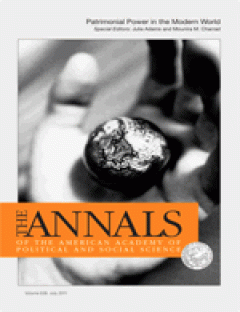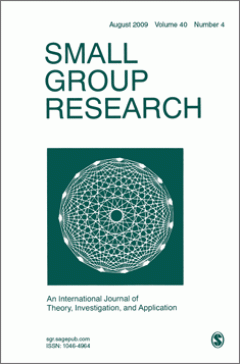Filter by

Patrimonial Alliances and Failures of State Penetration : A Historical Dynami…
The historical shift from patrimonialism to bureaucracy is the key organizational transformation of the past thousand years. Classically, patrimonialism was organization based on private households, plus alliances among them. But there are two types of patrimonial organization: expanded households and patrimonial alliances or pseudo-tribes. The latter include ad hoc warrior coalitions, frequent…
- Edition
- Vol. 636 no. 1, July 2011.pp. 16-31
- ISBN/ISSN
- 00027162
- Collation
- -
- Series Title
- The ANNALS of the American Academy of Political and Social Science
- Call Number
- -

Plebiscitarian Patrimonialism in Putin’s Russia : Legitimating Authoritaria…
The Putin-Medvedev transition reveals the continuing inability of post-Soviet Russian leaders to arrive at any consensual notion of Russia�s national identity around which ordinary forms of legitimate domination might be constructed. In searching for an answer to the problem of leadership succession during his second term as president, Vladimir Putin tried out all three of the classical types o…
- Edition
- Vol. 636 no. 1, July 2011.pp. 32-48
- ISBN/ISSN
- 00027162
- Collation
- -
- Series Title
- The ANNALS of the American Academy of Political and Social Science
- Call Number
- -

Central and Local Patrimonialism : State-Building in Kin-Based Societies
How useful is the concept of patrimonialism to analyze state formation and political dynamics in postcolonial nation-states? Using Tunisia, Morocco, and Iraq during critical periods of state-building following the end of colonial rule, the author considers this question. The purpose of the article is to build on Max Weber by exploring how patrimonialism operates in kin-based social contexts whe…
- Edition
- Vol. 636 no. 1, July 2011.pp. 49-68
- ISBN/ISSN
- 00027162
- Collation
- -
- Series Title
- The ANNALS of the American Academy of Political and Social Science
- Call Number
- -

The Legacies of Patrimonial Patriarchalism : Contesting Political Legitimacy …
In Chile, how citizens and political leaders have understood, incorporated, and contested the relationship between the familial and the political has been central to the development of their society. The author examines the ideological influence that familial beliefs had on the process of delegitimizing the presidency of Salvador Allende and legitimizing the military coup through an analysis of…
- Edition
- Vol. 636 no. 1, July 2011.pp. 69-87
- ISBN/ISSN
- 00027162
- Collation
- -
- Series Title
- The ANNALS of the American Academy of Political and Social Science
- Call Number
- -

Patrimonialism, Elite Networks, and Reform in Late-Eighteenth-Century Poland
Poland in the seventeenth and eighteenth centuries was more a m�lange of patrimonially organized latifundia than a sovereign state. Literature on the organization of work and politics on these magnate estates has identified a layer of voluntaristic clientage ties astride a set of more lopsided, purely patrimonial relations. Boundaries separating the personnel of these various estates were firm;…
- Edition
- Vol. 636 no. 1, July 2011.pp. 88-110
- ISBN/ISSN
- 00027162
- Collation
- -
- Series Title
- The ANNALS of the American Academy of Political and Social Science
- Call Number
- -

Where the State Feared to Tread : Conscription and Local Patriarchalism in Mo…
This article places feminist state theorists in dialogue with the Weberian �bellicist� tradition, and argues that locating patriarchalism within modern European states remains a worthwhile endeavor. By tracing conscription exemptions for fathers and husbands in France from the French Revolution�s lev�e en masse through to Napoleonic conscription and into the first half of the twentieth century,…
- Edition
- Vol. 636 no. 1, July 2011.pp. 111-128
- ISBN/ISSN
- 00027162
- Collation
- -
- Series Title
- The ANNALS of the American Academy of Political and Social Science
- Call Number
- -

African Patrimonialism in Historical Perspective : Assessing Decentralized an…
One of the most important political legacies of colonialism in Africa has been the reliance on the model of centralized bureaucratic administration, which has had disastrous consequences for African state-building. Like the colonial systems before them, these centralized bureaucracies have not functioned effectively. One of the main problems is a loose coupling between the formal bureaucratic s…
- Edition
- Vol. 636 no. 1, July 2011.pp. 129-149
- ISBN/ISSN
- 00027162
- Collation
- -
- Series Title
- The ANNALS of the American Academy of Political and Social Science
- Call Number
- -

Political Familism in Lebanon
Patrimonialism has been used to explain the �backwardness� of Middle Eastern states, their �lacks.� Patrimonialism, however, may undermine its own insights by creating false binaries and false histories. The author suggests family/families as a point of departure and political familism as a conceptual step toward reframing analysis of state/citizen relationships in Lebanon. Political familism r…
- Edition
- Vol. 636 no. 1, July 2011.pp. 150-163
- ISBN/ISSN
- 00027162
- Collation
- -
- Series Title
- The ANNALS of the American Academy of Political and Social Science
- Call Number
- -

Interlocking Patrimonialisms and State Formation in Qing China and Early Mode…
Familial power contributed to binding territories together and systematically severing them in both China and early modern European states. In the early Qing (1644�1911) Empire, Manchu conquerors met the challenges of securing and expanding rule by discovering ways to use laterally related brothers and imperial bondservants to hold Chinese bureaucrats in check, while deploying bureaucracy to re…
- Edition
- Vol. 636 no. 1, July 2011.pp. 164-181
- ISBN/ISSN
- 00027162
- Collation
- -
- Series Title
- The ANNALS of the American Academy of Political and Social Science
- Call Number
- -

Patrimony and Collective Capacity : An Analytical Outline
This article investigates the ways in which the appropriation of offices and positions for personal use (�patrimony�) shapes incentive structures and collective capacity. Within the context of an agency relation, patrimonial power characterizes a mode of political dominance and resource management excluding accountability. This micro-analytical definition identifies three sources of variation: …
- Edition
- Vol. 636 no. 1, July 2011.pp. 182-203
- ISBN/ISSN
- 00027162
- Collation
- -
- Series Title
- The ANNALS of the American Academy of Political and Social Science
- Call Number
- -

Coda : American Patrimonialism : The Return of the Repressed
Patrimonialism, until fairly recently, seemed an archaic social form, largely replaced by bureaucratic rationalism. That confident view of modernity, in the histories that Max Weber and his followers wrote, deserves to be challenged as patrimonial regimes reappear in states and firms throughout the world. This article is my attempt to mount that challenge. I first revisit Weber�s conception of …
- Edition
- Vol. 636 no. 1, July 2011.pp. 204-230
- ISBN/ISSN
- 00027162
- Collation
- -
- Series Title
- The ANNALS of the American Academy of Political and Social Science
- Call Number
- -

Who Becomes a Terrorist? : Poverty, Education, and the Origins of Political V…
Many studies of the social backgrounds of terrorists have found that they are wealthier and better educated than the population from which they are drawn. However, studies of political behavior have shown that all forms of political involvement are correlated with socioeconomic status. among those who are politically active, opportunity costs may lead those involved in nonviolent activities to …
- Edition
- Volume 63, Issue 02, April 2011. pp. 203-245
- ISBN/ISSN
- 00438871
- Collation
- -
- Series Title
- World Politics
- Call Number
- -

Guns and Butter? Regime Competition and the Welfare State during the Cold War
Scholars from a number of disciplines have argued that the massive expansion of the welfare state in the postwar period was at least in some part a byproduct of the cold war and the associated political competition between two rival regime blocs. However, the question of whether regime competition fuelled welfare-state growth has never been subject to systematic examination. Applying spatial ec…
- Edition
- Vol. 63, Number 2, April 2011.pp.246-270
- ISBN/ISSN
- 00438871
- Collation
- -
- Series Title
- World Politics
- Call Number
- -

Social Policy by Popular Demand
Why are unemployment benefits more generous in some countries? This article argues that citizens trade off the redistributive and insuring effect of social insurance. As a result, the distribution of risk in a society has important consequences via popular demand for social policy-making. At the microlevel, the article shows that, in addition to income, the risk of unemployment is a key predict…
- Edition
- Vol. 63< Number 2, April 2011.pp.271-299
- ISBN/ISSN
- 00438871
- Collation
- -
- Series Title
- World Politics
- Call Number
- -

The Enemy Within : Personal Rule, Coups, and Civil War in Africa
Why do rulers employ ethnic exclusion at the risk of civil war? Focusing on the region of sub-Saharan Africa, the author attributes this costly strategy to the commitment problem that arises in personalist regimes between elites who hold joint control of the state's coercive apparatus. As no faction can be sure that others will not exploit their violent capabilities to usurp power, elites maneu…
- Edition
- Vol. 63, Number 2, April 2011. pp. 300-346
- ISBN/ISSN
- 00438871
- Collation
- -
- Series Title
- World Politics
- Call Number
- -

Can Islamists Become Moderates? Rethinking the Inclusion-Moderation Hypothesis
Recent years have seen a surge of studies that examine the inclusion-moderation hypothesis with reference to political Islam: the idea that political groups and individuals may become more moderate as a result of their inclusion in pluralist political processes. Most of these interventions adopt one of three foci: (1) the behavioral moderation of groups; (2) the ideological moderation of groups…
- Edition
- Vol. 63, Number 2, April 2011. pp. 347-376
- ISBN/ISSN
- 00438871
- Collation
- -
- Series Title
- World Politics
- Call Number
- -

Social Category Salience Moderates the Effect of Diversity Faultlines on Info…
Faultlines�hypothetical dividing lines splitting a group into homogeneous subgroups based on the distribution of demographic attributes�are frequently assumed to be detrimental to group outcomes because they operationalize social categorizations. However, a literature review indicates that this is not always the case. We argue that diversity faultlines and social categorizations are not necessa…
- Edition
- Vol. 42 no. 3, June 2011 .pp. 257-282
- ISBN/ISSN
- 10464964
- Collation
- -
- Series Title
- Small Group Research
- Call Number
- -

Communication, Performance, and Perceptions in Experimental Simulations of Re…
The response of groups to the experience of coping with resource dilemmas has been an object of study by scholars in several of the social and behavioral sciences. Social norms, trust, and the perception of group identity form cooperative mechanisms critical to group cooperation. However, the opportunity to communicate has been singled out as the most important factor influencing group cooperat…
- Edition
- Vol. 42 no. 3, June 2011 .pp. 283-308
- ISBN/ISSN
- 10464964
- Collation
- -
- Series Title
- Small Group Research
- Call Number
- -

Faultlines, Fairness, and Fighting : A Justice Perspective on Conflict in Div…
Most people can recall instances at work where thankless tasks get in the way of tasks that lead to big rewards. This typically leads people in a group to a struggle with others over how to approach their work and set priorities. Inspired by such conversations with many employees, we develop a theory to understand how task conflict can be linked to distributive injustice. Using a survey from 42…
- Edition
- Vol. 42 no. 3, June 2011.pp. 309-340
- ISBN/ISSN
- 10464964
- Collation
- -
- Series Title
- Small Group Research
- Call Number
- -

The Existential Center of Small Groups : Member’s Conduct and Interaction
In every society groups rather than individuals are given responsibility for producing results that individuals potentially could produce just as well, but without the benefits of group effort. Once a small discussion group is convened, the members can be counted on to interact, often at length and sometimes contentiously, incontrovertible evidence that their interaction accomplishes something …
- Edition
- Vol. 42 no. 3, June 2011.pp. 343-358
- ISBN/ISSN
- 10464964
- Collation
- -
- Series Title
- Small Group Research
- Call Number
- -
 Computer Science, Information & General Works
Computer Science, Information & General Works  Philosophy & Psychology
Philosophy & Psychology  Religion
Religion  Social Sciences
Social Sciences  Language
Language  Pure Science
Pure Science  Applied Sciences
Applied Sciences  Art & Recreation
Art & Recreation  Literature
Literature  History & Geography
History & Geography